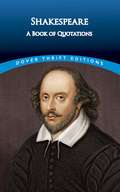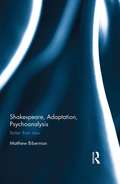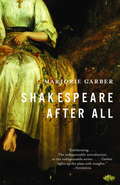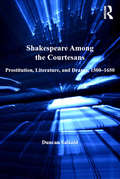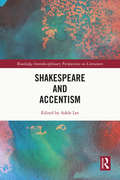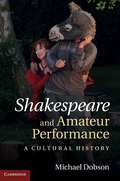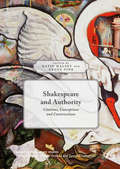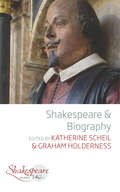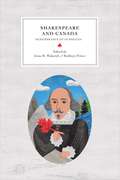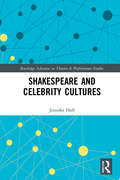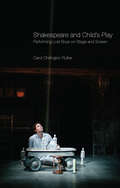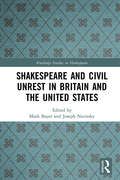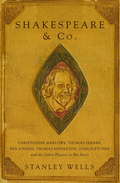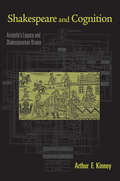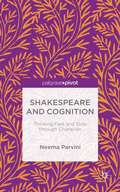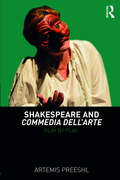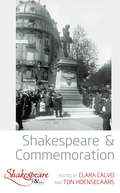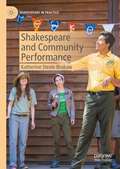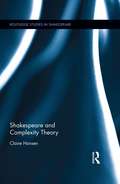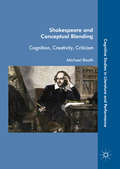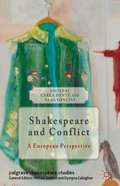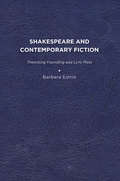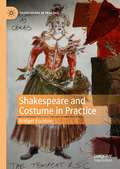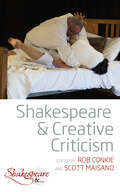- Table View
- List View
Shakespeare: A Book of Quotations (Dover Thrift Editions Ser. #Vol. 7)
by William ShakespeareShakespeare is without doubt the most quoted writer in English. His plays and poems comprise an inexhaustible source of memorable and often profound thoughts beautifully and concisely expressed. This remarkably affordable volume presents over 400 quotations conveniently arranged by topic: love, marriage, conduct and morality, truth, beauty, time, death, music, and more.Included are such timeless observations as: "All that glitters is not gold," "Brevity is the soul of wit," "How sharper than a serpent's tooth it is/ To have a thankless child"; "While you live, tell truth and shame the devil!"; "The very substance of the ambitious is merely the shadow of a dream," and many more. Romantic thoughts receive a particularly rich treatment; extensive selections on the subject of love include quotes from the plays ("The course of true love never did run smooth"; "Speak low if you speak love") and sonnets ("For thy sweet love remember'd such wealth brings,/ That then I scorn to change my state with kings"). Each quote bears a complete citation.Ideal for writers, speakers, students of literature, and any lover of Shakespeare's works, this inexpensive treasury lends itself admirably to a virtually endless number of uses, from casual browsing to designing personal greeting cards.
Shakespeare, Adaptation, Psychoanalysis: Better than New
by Matthew BibermanIn Shakespeare, Adaptation, Psychoanalysis, Matthew Biberman analyzes early adaptations of Shakespeare’s plays in order to identify and illustrate how both social mores and basic human psychology have changed in Anglo-American culture. Biberman contests the received wisdom that Shakespeare’s characters reflect essentially timeless truths about human nature. To the contrary, he points out that Shakespeare’s characters sometimes act and think in ways that have become either stigmatized or simply outmoded. Through his study of the adaptations, Biberman pinpoints aspects of Shakespeare’s thinking about behavior and psychology that no longer ring true because circumstances have changed so dramatically between his time and the time of the adaptation. He shows how the adaptors’ changes reveal key differences between Shakespeare’s culture and the culture that then supplanted it. These changes, once grasped, reveal retroactively some of the ways in which Shakespeare’s characters do not act and think as we might expect them to act and think. Thus Biberman counters Harold Bloom’s claim that Shakespeare fundamentally invents our sense of the human; rather, he argues, our sense of the human is equally bound up in the many ways that modern culture has come to resist or outright reject the behavior we see in Shakespeare’s plays. Ultimately, our current sense of 'the human' is bound up not with the adoption of Shakespeare’s psychology, perhaps, but its adaption-or, in psychoanalytic terms, its repression and replacement.
Shakespeare After All
by Marjorie GarberIn this text for scholars and general readers, Garber (English, Harvard U. ) considers the language, characters, and themes in the plays of William Shakespeare. Individual readings examine each of the 38 plays in chronological sequence, allowing the reader to trace Shakespeare's development as a writer and creator of dramatic scenarios. The volume also includes listings of film adaptations, an extensive bibliography, and background information on Shakespeare's life and times. Annotation ©2004 Book News, Inc. , Portland, OR (booknews. com)
Shakespeare, Alchemy and the Creative Imagination
by Margaret HealyShakespeare's Sonnets and A Lover's Complaint constitute a rich tapestry of rhetorical play about Renaissance love in all its guises. A significant strand of this is spiritual alchemy: working the 'metal' of the mind through meditation on love, memory work and intense imagination. Healy demonstrates how this process of anguished soul work - construed as essential to inspired poetic making - is woven into these poems, accounting for their most enigmatic imagery and urgency of tone. The esoteric philosophy of late Renaissance Neoplatonic alchemy, which embraced bawdy sexual symbolism and was highly fashionable in European intellectual circles, facilitated Shakespeare's inscription of an interior drama of a desiring mind creating poetry. Arguing that Shakespeare's incorporation of alchemical textures throughout his late works is indicative of an artistic stance promoting religious toleration and unity, this book sets out a crucial new framework for interpreting the 1609 poems, and transforms our understanding of Shakespeare's art.
Shakespeare Among the Courtesans: Prostitution, Literature, and Drama, 1500-1650 (Anglo-Italian Renaissance Studies)
by Duncan SalkeldCourtesans - women who achieve wealth, status, or power through sexual transgression - have played both a central and contradictory role in literature: they have been admired, celebrated, feared, and vilified. This study of the courtesan in Renaissance English drama focuses not only on the moral ambivalence of these women, but with special attention to Anglo-Italian relations, illuminates little known aspects of their lives. It traces the courtesan from a wry comedic character in the plays of Terence and Plautus to its literary exhaustion in the seventeenth-century dramatic works of Dekker, Marston, Webster, Middleton, Shirley and Brome. The author focuses especially on the presentation of the courtesan in the sixteenth century - dramas by Shakespeare, Marlowe, and Lyly view the courtesan as a symbol of social disease and decay, transforming classical conventions into English prejudices. Renaissance Anglo-Italian cultural and sexual relations are also investigated through comparisons of travel narratives, original source materials, and analysis of Aretino's representations of celebrated Italian courtesans. Amid these fascinating tales of aspiration, desire and despair lingers the intriguing question of who was the 'dark lady' of Shakespeare's sonnets.
Shakespeare and Accentism (Routledge Interdisciplinary Perspectives on Literature)
by Adele LeeThis collection explores the consequences of accentism—an under-researched issue that intersects with racism and classism—in the Shakespeare industry across languages and cultures, past and present. It adopts a transmedia and transhistorical approach to a subject that has been dominated by the study of "Original Pronunciation." Yet the OP project avoids linguistically "foreign" characters such as Othello because of the additional complications their "aberrant" speech poses to the reconstruction process. It also evades discussion of contemporary, global practices and, underpinning the enterprise, is the search for an aural "purity" that arguably never existed. By contrast, this collection attends to foreign speech patterns in both the early modern and post-modern periods, including Indian, East Asian, and South African, and explores how accents operate as "metasigns" reinforcing ethno-racial stereotypes and social hierarchies. It embraces new methodologies, which includes reorienting attention away from the visual and onto the aural dimensions of performance.
Shakespeare and Amateur Performance
by Michael DobsonFrom the Hamlet acted on a galleon off Africa to the countless outdoor productions of A Midsummer Night's Dream that now defy each English summer, Shakespeare and Amateur Performance explores the unsung achievements of those outside the theatrical profession who have been determined to do Shakespeare themselves. Based on extensive research in previously unexplored archives, this generously illustrated and lively work of theatre history enriches our understanding of how and why Shakespeare's plays have mattered to generations of rude mechanicals and aristocratic dilettantes alike: from the days of the Theatres Royal to those of the Little Theatre Movement, from the pioneering Winter's Tale performed in eighteenth-century Salisbury to the Merchant of Venice performed by Allied prisoners for their Nazi captors, and from the how-to book which transforms Mercutio into Yankee Doodle to the Napoleonic counterspy who used Richard III as a tool of surveillance.
Shakespeare and Authority
by Katie Halsey Angus VineThis book examines conceptions of authority for and in Shakespeare, and the construction of Shakespeare as literary and cultural authority. The first section, Defining and Redefining Authority, begins by re-defining the concept of Shakespeare's sources, suggesting that 'authorities' and 'resources' are more appropriate terms. Building on this conceptual framework, the remainder of this section explores linguistic and discursive authority more broadly. The second section, Shakespearean Authority, considers the construction, performance and questioning of authority in Shakespeare's plays. Essays here range from examinations of monarchical authority to discussions of household authority, literary authority and linguistic ownership. The final part, Shakespeare as Authority, then traces the increasing establishment of Shakespeare as an authority from the eighteenth to the twenty-first century in a series of essays that explore Shakespearean authority for editors, actors, critics, authors, readers and audiences. The volume concludes with two essays that reassess Shakespeare as an authority for visual culture - in the cinema and in contemporary art.
Shakespeare and Biography (Shakespeare & #8)
by Katherine Scheil Graham HoldernessFrom Shakespeare’s religion to his wife to his competitors in the world of early modern theatre, biographers have approached the question of the Bard’s life from numerous angles. Shakespeare & Biography offers a fresh look at the biographical questions connected with the famous playwright’s life, through essays and reflections written by prominent international scholars and biographers.
Shakespeare and Canada: Remembrance of Ourselves (Reappraisals: Canadian Writers)
by Annie Brisset Richard Cavell Dana Colarusso Daniel Fischlin Troni Grande Peter Kuling Sarah Mackenzie C. E. McGee Don Moore Ian Rae Tom Scholte Kailin WrightShakespeare in Canada is the result of a collective desire to explore the role that Shakespeare has played in Canada over the past two hundred years, but also to comprehend the way our country’s culture has influenced our interpretation of his literary career and heritage. What function does Shakespeare serve in Canada today? How has he been reconfigured in different ways for particular Canadian contexts? The authors of this book attempt to answer these questions while imagining what the future might hold for William Shakespeare in Canada. Covering the Stratford Festival, the cult CBC television program Slings and Arrows, major Canadian critics such as Northrop Frye and Marshall McLuhan, the influential acting teacher Neil Freiman, the rise of Québécois and First Nation approaches to Shakespeare, and Shakespeare’s place in secondary schools today, this collection reflects the diversity and energy of Shakespeare’s afterlife in Canada. Collectively, the authors suggest that Shakespeare continues to offer Canadians “remembrance of ourselves.” This is a refreshingly original and impressive contribution to Shakespeare studies—a considerable achievement in any work on the history of one of the central figures in the western literary canon.
Shakespeare and Celebrity Cultures (Routledge Advances in Theatre & Performance Studies)
by Jennifer HollThis book argues that Shakespeare and various cultures of celebrity have enjoyed a ceaselessly adaptive, symbiotic relationship since the final decade of the sixteenth century, through which each entity has contributed to the vitality and adaptability of the other. In five chapters, Jennifer Holl explores the early modern culture of theatrical celebrity and its resonances in print and performance, especially in Shakespeare’s interrogations of this emerging phenomenon in sonnets and histories, before moving on to examine the ways that shifting cultures of stage, film, and digital celebrity have perpetually recreated the Shakespeare, or even the #shakespeare, with whom audiences continue to interact. Situated at an intersection of multiple critical conversations, this book will be of great interest to scholars and graduate students of Shakespeare and Shakespearean appropriations, early modern theater, and celebrity studies.
Shakespeare and Child's Play: Performing Lost Boys on Stage and Screen
by Carol Chillington RutterShakespeare wrote more than fifty parts for children, amounting to the first comprehensive portrait of childhood in the English theatre. Focusing mostly on boys, he put sons against fathers, servants against masters, innocence against experience, testing the notion of masculinity, manners, morals, and the limits of patriarchal power. He explored the nature of relationships and ideas about parenting in terms of nature and nurture, permissiveness and discipline, innocence and evil. He wrote about education, adolescent rebellion, delinquency, fostering, and child-killing, as well as the idea of the redemptive child who ‘cures’ diseased adult imaginations. ‘Childness’ – the essential nature of being a child – remains a vital critical issue for us today. In Shakespeare and Child’s-Play Carol Rutter shows how recent performances on stage and film have used the range of Shakespeare’s insights in order to re-examine and re-think these issues in terms of today’s society and culture.
Shakespeare and Civil Unrest in Britain and the United States (Routledge Studies in Shakespeare)
by Mark BayerShakespeare and Civil Unrest in Britain and the United States extends the growing body of scholarship on Shakespeare’s appropriation by examining how the plays have been invoked during periods of extreme social, political, and racial turmoil. How do the ways that Shakespeare is adapted, studied, and discussed during periods of civil conflict differ from wars between nations? And how have these conflicts, in turn, affected how Shakespeare has been understood in these two countries that, more than any others, continue to be deeply shaped by Shakespeare’s complex, enduring, and multivalent legacy? The essays in this volume collectively disclose a fascinating genealogy of how Shakespeare became a dynamic presence in factional discourse and explore the "war of words" that has accompanied civil wars and other instances of domestic disturbance. Whether as part of violent confrontations, mutinies, rebellions, or within the universal struggle for civil rights, Shakespeare’s repeated appearance during such turbulent moments is more than mere historical coincidence. Rather, its inflections on the contested meanings of citizenship, community, and political legitimacy demonstrate the generative influence of the plays on our understanding of internecine strife in both countries.
Shakespeare and Co.
by Stanley Wells'Enjoyable, lively hellip; such a pleasure to read hellip; renders the drama of Shakespeare's contemporaries more than fringe entertainment' Independent Shakespeare is one of the greatest of all English figures, considered a genius for all time. Yet as this enthralling book shows, he was at heart a man of the theatre, one among a community of artists in the teeming world of Renaissance London - from the enigmatic spy Christopher Marlowe to the self-aggrandizing Ben Jonson, from the actor Richard Burbage to the brilliant Thomas Middleton. By bringing Shakespeare's contemporaries to life, Shakespeare & Co throws fresh new light on the man himself 'Warm, cheerful, generous hellip; Wells sketches a whole gallery of Shakespeare's fellow playwrights hellip; He brings each vividly to life, making you feel that you've met them personally in some Blackfriars tavern' Simon Callow 'It was a time and place teeming with excitement, anecdote and incident, and Wells, in this richly enjoyable work, brings it to life with a novelist's sense of the telling detail' Dominic Dromgoole 'Enthralling' Observer 'This is one of the most sane and exciting books on Shakespeare I have read for a long time' Scotland on Sunday
Shakespeare and Cognition: Aristotle's Legacy and Shakespearean Drama
by Arthur F. KinneyShakespeare and Cognition examines the essential relationship between vision, knowledge, and memory in Renaissance models of cognition as seen in Shakespeare's plays. Drawing on both Aristotle's Metaphysics and contemporary cognitive literary theory, Arthur F. Kinney explores five key objects/images in Shakespeare's plays – crowns, bells, rings, graves and ghosts – that are not actually seen (or, in the case of the latter, not meant to be seen), but are central to the imagination of both the playwright and the playgoers.
Shakespeare and Cognition: Thinking Fast and Slow through Character
by Neema ParviniShakespeare and Cognition.
Shakespeare and Commedia dell'Arte: Play by Play
by Artemis PreeshlShakespeare and Commedia dell’Arte examines the ongoing influence of commedia dell’arte on Shakespeare’s plays. Exploring the influence of commedia dell’arte improvisation, sight gags, and wordplay on the development of Shakespeare’s plays, Artemis Preeshl blends historical research with extensive practical experience to demonstrate how these techniques might be applied when producing some of Shakespeare's best-known works today. Each chapter focuses on a specific play, from A Midsummer Night’s Dream to The Winter’s Tale, drawing out elements of commedia dell’arte style in the playscripts and in contemporary performance. Including contemporary directors’ notes and interviews with actors and audience members alongside Elizabethan reviews, criticism, and commentary, Shakespeare and Commedia dell’Arte presents an invaluable resource for scholars and students of Renaissance theatre.
Shakespeare and Commemoration: Commemoration And Cultural Memory (Shakespeare & #2)
by Clara Calvo Ton HoenselaarsMemory and commemoration play a vital role not only in the work of Shakespeare, but also in the process that has made him a world author. As the contributors of this collection demonstrate, the phenomenon of commemoration has no single approach, as it occurs on many levels, has a long history, and is highly unpredictable in its manifestations. With an international focus and a comparative scope that explores the afterlives also of other artists, this volume shows the diverse modes of commemorative practices involving Shakespeare. Delving into these “cultures of commemoration,” it presents keen insights into the dynamics of authorship, literary fame, and afterlives in its broader socio-historical contexts.
Shakespeare and Community Performance (Shakespeare in Practice)
by Katherine Steele BrokawThis book explores how productions of Shakespearean plays create meaning in specific communities, with special attention to issues of access, adaptation, and activism. Instead of focusing on large professional companies, it analyzes performances put on by community theatres and grassroots companies, and in applied drama projects. It looks at Shakespearean productions created by marginalized populations in Greater London, Harlem, and Los Angeles, a Hamlet staged in the remote Faroe Islands, and eco-theatre made in California’s Yosemite National Park. The book investigates why different communities perform Shakespeare, and what challenges, opportunities, and triumphs accompany the processes of theatrical production for both the artists and the communities in which they are embedded.
Shakespeare and Complexity Theory (Routledge Studies in Shakespeare)
by Claire HansenIn this new monograph, Claire Hansen demonstrates how Shakespeare can be understood as a complex system, and how complexity theory can provide compelling and original readings of Shakespeare’s plays. The book utilises complexity theory to illuminate early modern theatrical practice, Shakespeare pedagogy, and the phenomenon of the Shakespeare ‘myth’. The monograph re-evaluates Shakespeare, his plays, early modern theatre, and modern classrooms as complex systems, illustrating how the lens of complexity offers an enlightening new perspective on diverse areas of Shakespeare scholarship. The book’s interdisciplinary approach enriches our understanding of Shakespeare and lays the foundation for complexity theory in Shakespeare studies and the humanities more broadly.
Shakespeare and Conceptual Blending
by Michael BoothThis book shows how Shakespeare's excellence as storyteller, wit and poet reflects the creative process of conceptual blending. Cognitive theory provides a wealth of new ideas that illuminate Shakespeare, even as he illuminates them, and the theory of blending, or conceptual integration, strikingly corroborates and amplifies both classic and current insights of literary criticism. This study explores how Shakespeare crafted his plots by fusing diverse story elements and compressing incidents to strengthen dramatic illusion; considers Shakespeare's wit as involving sudden incongruities and a reckoning among differing points of view; interrogates how blending generates the "strange meaning" that distinguishes poetic expression; and situates the project in relation to other cognitive literary criticism. This book is of particular significance to scholars and students of Shakespeare and cognitive theory, as well as readers curious about how the mind works.
Shakespeare and Conflict
by Carla Dente Sara SonciniWhat has been the role played by principles, patterns and situations of conflict in the construction of Shakespeare's myth, and in its European and then global spread? The fascinatingly complex picture that emerges from this collection provides new insight into Shakespeare's unique position in world literature and culture.
Shakespeare and Contemporary Fiction: Theorizing Foundling and Lyric Plots
by Barbara L. EstrinIn the first book to use fiction as theory, Barbara L. Estrin reverses chronological direction, beginning with contemporary novels to arrive at a re-visioned Shakespeare, uncovering a telling difference in the stories that script us and that influence our political unconscious in ways that have never been explored in literary-critical interpretations. Describing the animus against foreign blood, central to the dynamic of the foundling and lyric plots that form the nexus of her study, Estrin describes how late modern writers change those plots. Reading backward through the theoretical lens of their revisions allows us to rethink the Shakespeare we thought we knew. That innovative methodology, in turn, encourages us to read forward again with different tellings, ones that challenge the mythological homogeneity of the traditional classifications and that suggest new formulaic paradigms. With close readings of four contemporary novels and three Shakespeare plays, Estrin identifies the cultural walls that contribute to political gate-keeping as she chronicles the connection between plot variations and gender revisionism in the work of Caryl Phillips, Liz Jensen, Anne Michaels, and W.G. Sebald, as well as two film-makers (Mona Hatoum and Mieke Bal) who demonstrate an understanding that mythical repercussions prove dangerous in the twentieth and twenty-first centuries even as they suggest how the heritage shaping their work, and to which they are themselves drawn, in turn proposes an alternative Shakespeare, one who frees us to ask other questions: At the time that the nation state was beginning to coalesce, what does Shakespeare’s frequent use of the foundling plot and his significant variations portend? How does his infusion of a revised lyric dynamic in The Merchant of Venice, Othello and The Winter’s Tale change our reading of plays where the two plots coalesce as they do in the contemporary novels that shape Estrin’s late modern interpretations? All the works in this study share the underlying premise that the connection between cultural origins and political destinies is reciprocal and that it is necessary and possible to transform the constructs—in memory and imagination—that continue to shape our lives. Published by University of Delaware Press. Distributed worldwide by Rutgers University Press.
Shakespeare and Costume in Practice (Shakespeare in Practice)
by Bridget EscolmeWhat is the role of costume in Shakespeare production? Shakespeare and Costume in Practice argues that costume design choices are central not only to the creation of period setting and the actor’s work on character, but to the cultural, political, and psychological meanings that the theatre makes of Shakespeare. The book explores questions about what the first Hamlet looked like in his mourning cloak; how costumes for a Shakespeare comedy can reflect or critique the collective nostalgias a culture has for its past; how costume and casting work together to ask new questions about Shakespeare and race. Using production case studies of Hamlet, Much Ado About Nothing, and The Tempest, the book demonstrates that costume design can be a site of experimentation, playfulness, and transgression in the theatre – and that it can provoke audiences to think again about what power, race, and gender look like on the Shakespearean stage.
Shakespeare and Creative Criticism (Shakespeare & #4)
by Rob Conkie Scott MaisanoWhat kinds of critical insights are made possible only or especially via creative strategies? This volume examines how creative modes of writing might facilitate or inform new ways to critically engage with Shakespeare. Creative writing, demonstrated in a series of essays, reflections, stories and scenes, operates as a vehicle for exploring and articulating critical and theoretical ideas. In doing so, Shakespeare’s enduring creative and critical appeal is newly understood and critiqued.
